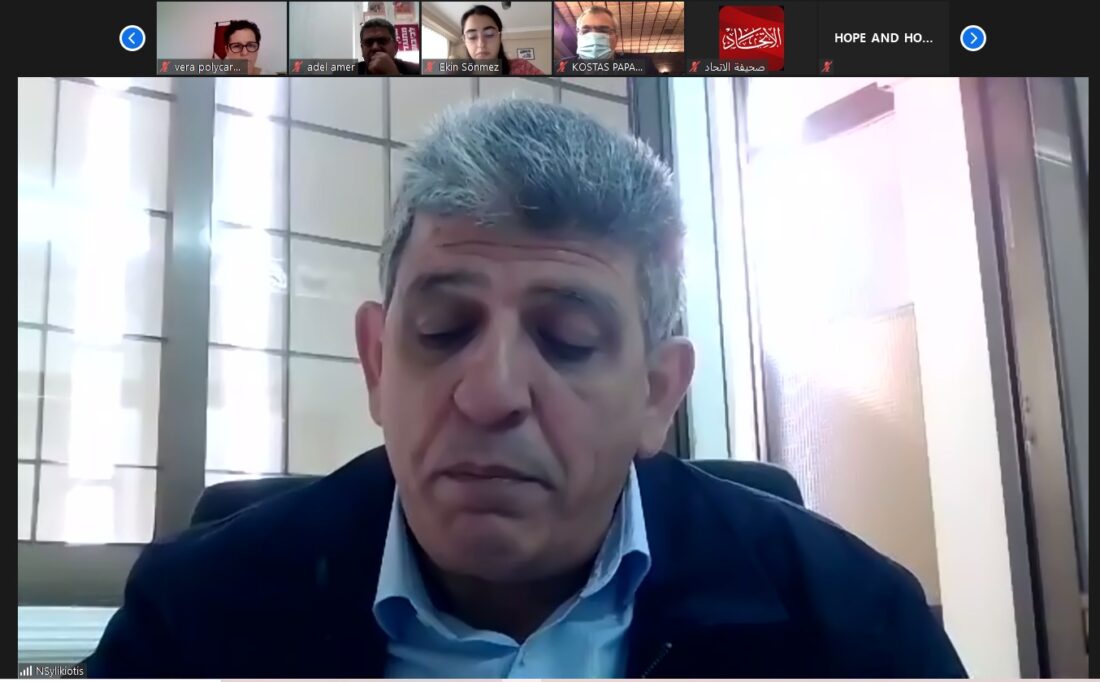
“Capitalism is not green – An alternative look to climate change”
Speech by Christina Nikolaou, Head of the Environmental Bureau of the C.C. of AKEL, to the initiative organized by the Portuguese Communist Party PCP
13th September 2019, Lisbon. Portugal
Dear friends and comrades,
First of all, I would like to thank the Portuguese Communist Party PCP for the invitation to participate in today’s discussion. On this opportunity, I would also like to convey the comradely greetings of AKEL to the Communists of Portugal.
Friends and comrades,
There is no better time to discuss this issue than now, as climate change is perhaps the most timely and urgent issue of our time. It should be a priority for us, to submit concrete proposals to society on how to solve all these environmental problems, since it is absolutely certain that capitalism cannot be represent the alternative.
Green capitalism is destined to fail: You can’t keep doing the same thing and expect different results. We can’t shop our way out of global warming nor are there technological magic wands that will save us. There is no alternative other than the dramatic change in the organization of the global economy and consumption patterns.
Is it possible to run an expanding capitalist economy while keeping its impacts within safe ecological boundaries, or is the greed-driven system effectively a suicide machine that is doomed to destroy itself? I think the answer is not difficult to find.
The fact that the current dominant capitalist economic system is unsustainable is not in doubt. It has contributed to the breaching of several ecological boundaries, in relation to climate change, biodiversity loss and nutrient enrichment. At the same time as damaging the natural systems that sustain it, capitalism is also leading to increasing inequality, in turn generating social tensions that make it even more exposed.
The problem with “green” or “sustainable” development, or green capitalism, is not the aggressive identification, which is used to embellish what is at the core, but about the one-dimensional and compulsory substance that development receives in capitalism, that is, production for capital accumulation and profit.
The European Union has, over the past decade, promoted the “green growth strategy” as a “tool” for escaping, not only from environmental degradation, but also from the economic crisis. Most of the ruling parties in the EU have hastily adopted the “strategy”. However, the question arises as to whether these are ‘green’ policies or policies built on principles that are not characterized by a radical redefinition of economic and natural environment relations.
Does capitalism have the ability in the context of the market and free competition, to tackle the major problems it has created on our planet? For us, AKEL, the answer in no. We strongly believe that the theory of “green capitalism” is yet another trick to try to disorientate the whole discussion. The deadlocks in the management of limited natural resources is caused by the capitalist system itself. At the same time, it raises the question of how industrial capital will accept to introduce ecological criteria in the context of the development process, which is one-dimensional oriented to serve the maximisation of profit.
The impasse of all the measures being applied, starting from biofuels, which in fact exacerbate the food crisis to fuel SUVs, up to polluting markets (while financial markets collapse), through which powerful funds gain the ability to expand the pollution they produce by “transposing” it around the globe (pollution rights trade), make the absolute impasse of these “solutions” visible. In essence, the environment is now a new arena of competition. Everyone can understand that the idea of these mechanisms is unethical as environmental, as it shows. The EU established a bargain between states and industrial units, with a basic criterion of whether it is appropriate to reduce their fossil fuel-based energy production, versus the profit they will have from selling the emissions to third parties.
Dear comrades,
We believe that major environmental problems cannot be solved on the basis of these mechanisms, by the same system that not only creates, but also reproduces and aggravates them. Based on current realities and global political balances, AKEL participates and puts forth ways and specific policies to avoid and combat such catastrophic developments.
The real question today is whether an economic system that supports people and planet is still possible!
According to data released by the Centre of Research on the Epidemiology of Disasters, in 2018 so far approximately 5,000 people have died and 28.9 million have needed emergency assistance or humanitarian aid because of extreme weather. Droughts, freezing weather, heatwaves, flooding are just some of the natural disasters that have devastated entire communities around the world in 2018, killing thousands of people and inflicting billions of dollars in damage. 2019 wasn’t any different, as expressed most poignantly by the Amazon fires. The scale of the devastation caused by the wildfires still raging in the Amazon is hard to comprehend. July 2019 was the hottest month ever recorded on Earth, while at the same time there has been a dramatic increase in the number of fires in areas such as Alaska, Greenland and Siberia where no fires had previously ever been recorded. The fires in the Amazon forest follow this frightening domino now transforming climate change not just into a climate crisis, but an ecological nightmare that raises dramatic questions about our planet’s very future. All the above unfortunately are the result of the ongoing relentless exploitation of nature.
What is happening to Brazil constitutes a clear example of what has previously been mentioned, because the fires in Amazon are not unrelated to the January 2019 election of Bolsonaro to the Brazilian presidency. This is a far-right politician, who enjoys the unconditional support of US President Trump’s administration and who the EU has been tacitly supporting to stop the road to the Left in this important country of Latin America.
A few months after Bolsonaro’s election, deforestation rates began to rise sharply. The far-right President, supporting and serving the powerful economic and financial interests in Brazil and internationally, handed parts of the Amazon over to private individuals for exploitation, and in doing so is abolishing or curbing policies aiming to protect the environment and the Amazon region. The Bolsonaro government has undermined and curbed the environmental department and promoted the opening up of the Amazon to mining, agriculture and logging. For months, it has been steadfastly refusing to activate state mechanisms, leaving thousands of fires out of control, threatening the indigenous peoples that inhabit the area, among others.
The conclusion is simple: the environmental crisis is the direct result of capitalist development and over-consumerism in the so-called advanced capitalist world, which glorifies profit and puts it before our planet’s very existence. The environmental crisis is connected to the ongoing aggressive wars that are caused by imperialism’s mania to secure the control of the world’s natural wealth and resources.
Going back to the question if an economic system that supports people and our planet is still possible the answer might be simple. It is feasible, but it needs a lot of effort and struggles by all the progressive parties around the globe. The dilemma has never been clearer. Either we will develop a different economy, in which the key criterion will not be the profitability of capital and maximisation of profit, but social benefit and the maintenance of an ecological balance, or we will sacrifice our very life for the sake of the interests of big capital.
We cannot remain mere spectators in the face of all these developments, waiting for others to decide that climate change is a crisis worthy of a Rescue Plan.
For AKEL, a key priority is the well-being of people in a society based on equality, the preservation of natural resources and demonstrating the necessary respect to all forms of life on the planet. AKEL’s proposal aims at fair and sustainable production processes and relationships that extend to the level of socio-economic change, always based on the specific conditions of our country.
AKEL considers that environmental policy today should, above all, include the adoption and implementation of new economic and social development policies, which will take into account the conditions discussed above and aim at preserving the potential of the ecosystem and natural resources, within the framework of a more general and comprehensive Sustainable Development Strategy. Towards this end, the state and society itself must revise the policies of reckless economic development and growth, within the framework of a nationwide campaign, to adapt to the new adverse climatic and economic conditions that have begun to affect our rapidly growing population, countries and lives.
We strongly believe that a final solution to the environmental issue cannot be achieved unless the dominant model of capitalism is changed, but at the same time we believe that we have to cultivate environmental awareness and sensitivity in all its forms to society. The environmental issue, viewed in its correct approach as a socio-economic policy issue, should be integrated into all levels of education and we have to try to inform people in a continuous and transparent way about environmental issues. To that end, AKEL very often organizes, inter alia, various campaigns, conferences and mobilizations both on a national and local level, always seeking to involve young people, children, working people and even pensioners; Last summer, for example, the children camps of our Youth Organization EDON had the issue of the environment as one of their main activities and themes.
One of the main pillars of our struggle must be the struggle for international peace and disarmament in order to stop the catastrophic ongoing wars and abolish the network of military bases around the world which along with all the other problems they create also destroy the natural environment. As far as Cyprus is concerned, the solution of the Cyprus problem with the aim of reunifying our common homeland is a prerequisite for unifying the natural environment of our country.
The popular masses and working people are disproportionately affected by the degradation of the environment, in relation to the most affluent groups of the population, who always find ways to exploit natural reserves. For that reason, the struggle to solve the environmental problem is directly linked to the socio-economic struggle, it is a fight for a fairer and more humane society.
Dear friends and comrades,
Contemporary analysis of environmental problems, both at an academic and research level, as well as at a political economy level, concludes, that the cause of the environmental problem, on a global scale, historically, is the predominance of the capitalist system and in recent decades, the intensification of capitalist globalization through the imposition of Neoliberalism. The environmental issue is deeply political and the degree of the organization of the forces that resist this catastrophic path is expected to determine the future of the next generations
At this crucial turning point in human history, the left movement is the only political and social force of hope. And it is our duty to project and provide this hope to the peoples.
Thank you very much.




